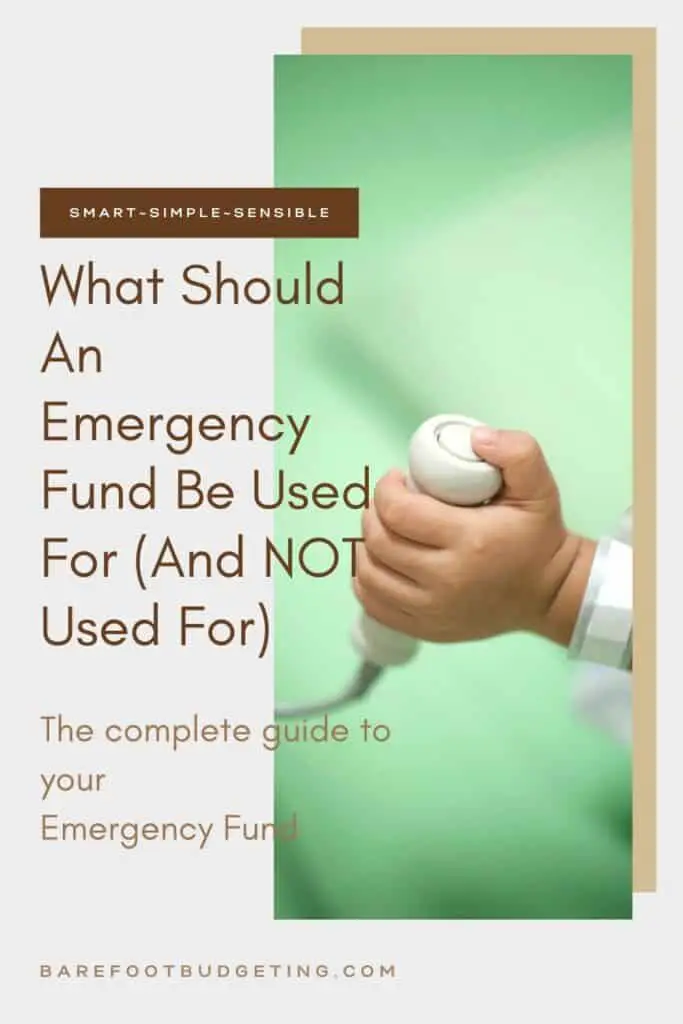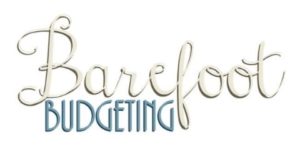*This post may contain affiliate links. As an Amazon Associate we earn from qualifying purchases.
What Should an Emergency Fund Be Used for (And NOT Used for)
It can be hard to know what the best use for your emergency fund can be used for and what an emergency fund should not be used for. A lot of people don’t even know what an emergency fund is, let alone how to use it.
Like the name says ’emergency fund’ you would think any emergency qualifies. But there are times when an emergency fund might not be the best option. Let’s take a closer look at what can an emergency fund be used for and what an emergency fund shouldn’t be used for.
To make it easier to understand we’ll explain the purpose and definition of an emergency fund and provide some examples of when you should (or shouldn’t) withdraw from your emergency fund.
You’ll learn how to make the most out of an emergency fund so that it can serve its function when needed most while still being able to grow over time.
What Is An Emergency Fund?
A pandemic hits, you lose your job and the mortgage is due, kids need food and you need stitches from a DIY project gone kaflooey.
- A. You risk foreclosure, raid your mom’s refrigerator and grab the duct tape for your wound or
- B. You take a deep breath, know it’s time to transfer some funds from your emergency fund into your working checking account (one used for bills).
An emergency fund (as a kid it was called a rainy day fund or stash) is money set aside for true unforeseen emergencies. Think of it as your self-funded financial insurance policy.
Regardless of your answer to A or B, you know what is probably know which one you’d prefer.
A few years ago no one would have thought this could happen and yet here we are talking about emergency funds in a very relatable way.
Why Do I Need An Emergency Fund?
Think of your emergency fund as an income insurance policy. It’s there to protect you when life throws a curveball, and it’s something everyone should have. A rainy day fund is designed to cover unexpected emergencies such as lost income, medical costs, or car repairs.
If you’re not prepared for the worst-case scenario, then you will be forced to turn to credit cards or loans that carry high interest rates and can quickly become unmanageable debts. These are things no one wants to deal with in a time of crisis – so start preparing today!
It also provides peace of mind for those who live paycheck to paycheck and helps protect against further emergencies. The money in it should be kept liquid, readily available, and easily accessible. If there is a sudden loss of income due to injury, illness, or uninsured job loss necessities are covered.
I have personally seen how an unexpected job loss can quickly turn into a financial disaster. It can take years to recover and for some, never at all from one emergency situation.
I’ve also experienced an unexpected critical illness have zero financial impact. This allowed for time to care for my loved one and be present for all the important appointments.
How Much Should I Have In My Emergency Fund
Your first emergency fund savings goal is based on your personal average income after taxes. Aim to start with $1000. You can boost this with any gifts you receive, bonuses, yard sales, side-gigs.
Start by saving and setting aside 10% of your net pay and put in a separate savings (not checking) account. In addition to using your net pay to contribute, use gift money and any cash payments you may get from things like yard sales or side gigs.
Save 3 months – 6 months of your net pay altogether. Some save more. We are saying for this to be an ’emergency’ fund.
An emergency fund is not used for retirement goals, vacation, etc. An emergency fund is used for unforeseen financial loss to cover essentials. While some save more, we recommend that 3-6 months is a safe goal for most Americans.
Reviewing Your Monthly Budget
It’s important to do a regular review of your budget, look for ‘loose ends’ and gaps where you can save a bit more towards this emergency fund goal. This is also a great way to know the current situation of your necessities. You’ll quite likely find some more ways to save. You may even identify where you need to supplement your income for an added savings boost.
Must Read: Best Tips For Creating A Budget
My all-time favorite way to jump-start my savings is to take a no-spend weekend or even a week. I not only have time to reflect on my budget but add a bit extra towards savings.
Building Your Emergency Fund $1 At A Time
Baby steps. Building your emergency fund is a process. Most are unable to fund this fully within a year. It takes time, be patient and be cosistent. Remember to add extra at every opportunity you have additional money to your regular income.
We’ll just take a minute to remind you here an emergency fund should not be used for things like a down payment on a car or even paying down debt. Those should be budgeted separately.
You want to build your emergency fund as consistently as possible thus the 10% per pay cycle towards your emergency savings goal.
Use a percentage of your tax return (minimum 10%) for Emergency Fund Savings. So many make plans for this money towards ‘splurge’ items. Some responsibly plan towards debt to be paid down. None of these are wrong. You worked hard and deserve some added instant gratification benefits. I get it. There’s a time and place and percentage for everything.
You want to treat your emergency fund with just as much importance as any expense or “want”. This fund could possibly mean you surviving a crisis someday and you’ll rest easier knowing it’s there waiting to embrace you during a difficult time. Trust me when I tell you that having this fund can make or break you through tough times.
You Can Do It! Recommended Emergency Fund Levels To Shoot For Over Time:
- $1,000.00
- One Month’s Net (take home) income
- Three Month’s Net (take home) income
- Six Month’s Net (take home) income

When The “Bad News Can Turn Into Good News” (or at least “Not So Bad News”)
Unexpected financial loss of income in contrast to unexpected expenses…
When faced with sudden financial “bad news,” the crisis does not have to have such a large, if any budget impact. An emergency fund rarely if ever creates stress on the family finances or goals, which is good news.
Layoffs, Job Loss, Illness, “Oh my..!”
First things first, apply for all unemployment benefits and others you may be eligible for. Use the government websites to get an estimate of benefits should you be approved. You can find resource links and phone numbers online at Benefits.gov
The loss of a job in a layoff can be like walking a financial tightrope. An emergency fund is that safety net, keeping you from any injury to the necessities in life.
This is definitely one of the times in life you’ll be thanking your lucky stars you know the answer to the big question, what should emergency fund be used and breathe a little easier.
Sit down and review your budget first, see what your necessities are, and make appropriate cuts. See where your emergency fund can help get you through until you start receiving unemployment benefits. Proceed cautiously. Everything you need to know about unemployment insurance, benefits and budgeting on unemployment can be found here:
What To Do If You Get Laid Off & How To Survive Financially
“Hey Ralph, The Washing Machine Broke, Which Mattress Did We Put That Money In?” (When An Emergency Fund Should Be Used)
What should you use an emergency fund for again? Your washing machine breaks, your dryer is tossing out damp clothes. First, think smart. Is this covered under a guarantee or warranty? Can it be repaired at a fraction of the cost?
Assess your needs. Do you need the deluxe model now that the kids have moved out or do you need a larger washer with more kids at home? Do your homework and check the reviews, the warranty, and any rebates your store offer as well as any energy rebates you’re eligible for with your electric or gas company.
Yes, after you’ve looked over your budget you can borrow from your emergency fund. Remember, you want to replenish that fund as soon as you can.
You actually haven’t had a near devastating emergency here, so an emergency fund should not be used for expenses like this on a regular basis, but let’s face it, stinky clothes and grungy towels aren’t good for keeping employed, so we’ll let this one pass as a ‘borrow from emergency fund’ short term loan from yourself.
An emergency fund is used for unforeseen financial loss to cover essentials. While you probably knew the washing machine was acting up and definitely the dryer is on its way out, these are essentials in most households and count. However, use this as a life lesson to budget in the future for household and home repairs.
Loss of Income: Monthly Essentials Only (Hey you, Webster’s has something to tell about Essentials!)
When you’re trying to weigh out what an emergency fund should be used for and the dreaded when not to use your fund, it helps to know the actual definition as a guide of what is essential. Voila, the dictionary to the rescue!
Definition of essential (source: Merriam-Webster)
- of the utmost importance : BASIC, INDISPENSABLE, NECESSARY
- something necessary, indispensable, or unavoidable
Ask yourself based on the definition before spending from your emergency fund, is this necessary or indispensable, is this unavoidable?
A loss of income almost always qualifies for emergency fund spending.
You will want to look at your essential expenses. Go to the article on getting laid off, which talks in depth about unemployment insurance to see if you qualify for that or other benefits. I think you’ll find a lot of useful information that can help guide you.
Medical Crisis: High Deductibles, Co-Insurance
An unexpected serious illness can bring enormous bills and loss of income without being eligible for unemployment insurance.
High deductibles, co-insurance, even no insurance. This can bring a lifetime of debt. All this in addition to losing job income during this crisis. Housing costs, utilities, car payments, etc. all still have to be paid.
While you may qualify for disability income or some financial relief, it could be several months before you see that help, if ever. An emergency fund allows peace of mind during this time allowing you to get back to health.
Major Home Repairs: Roofing, Plumbing, Electrical
In our part of the country, winters can be brutal. We’ve had years where the news is reporting left and right about ice dams, roof leaks and frozen pipes bursting. An ouce of prevention goes a long way. (roof shovels, pipe insulation, etc.) However, sometimes there’s no winning with mother nature and you get hit with an unexpected emergency and plumbers and roofers don’t have lay-a-way plans!
Emergency Fund (your own personal financial insurance plan) to the rescue and I’ll bet you’re thankful for the money you put in. Next time someone asks what an emergency fund can be used for or dare ask what good is it, you’ll have all the answers.
Some day I’ll tell you all about the expenses we got hit hard with when lightning hit our well!
Major Car Repair/Loss of Transportation
Have you ever had a major car repair? Yep, I thought so. You know where I’m going then. It’s not only unexpected but a huge inconvenience, potentially worse.
Let’s say you not only have the monster bill you’re expecting for the repair, but you JUST started a job after being out of work for 6 months! Well, suppose you don’t have any friends or relatives with a spare car laying around for just this occasion (didn’t think so). Now you have a rental expense as an added kick.
What an emergency fund should be used for here are car repairs and a rental as needed. What an emergency fund should not be used for is a convertible rental on that shiny new model and taking a weekend drive along the coastline. Nope, sorry, not the emergency fund part of your budget. Nice try.
Essential Home Appliance Replacement/Due to Loss
You can live without a garbage disposal, you don’t get to replace a refrigerator because you want fingerprintless stainless steel…etc
An emergency fund shouldn’t be to purchase things like the latest greatest computerized kitchen refrigerator to replace your current one. That’s a ‘want’ not a necessity and certainly not something that qualifies for emergency fund use.
An emergency fund should be used for an unrepairable, broken appliance that is ‘essential’ (go back to Webster’s definition).

Pet Emergencies (“Just a DOG, how dare you?!”)
Once you stop living paycheck to paycheck (link) look into pet insurance.
Furbaby mom here! I have two large dogs and have been a proud mamma of many over the years. Yes, there are pet emergencies and yes, if you are a responsible owner their emergencies are real and important.
A true pet emergency needs to be brought to the vet. This would be an illness, injury, etc. A non-pet emergency (seriously, the furbaby doesn’t mind waiting) would be a trip to the groomers. That can be done at home by you guessed it, you, yourself.
We all know there are times when needs and wants blur lines. We also have recently seen times when a world crisis can turn into your crisis at the sign of a cough. Financial disasters can be just as devastating as a pandemic and I can’t think of any better example of when it’s a good time to start or buffer your emergency fund.
When you think about if, your hard-earned and saved emergency fund is your security blanket, your guardian angel. There to protect and comfort your needs in times of great money stresses.
Honey, hang on to that fund and nurture it with added funds whenever possible. You know what they say “Don’t Put Off Til Tomorrow What You Can Do Today” because a year from now you’ll wish you had already started. Get started, don’t look back, don’t look to even check if it’s o.k. to spend. When the time comes, trust me, you’ll know. For those times you aren’t sure, well then repeat reading this article as needed.
GREAT READ: ASK YOURSELF THESE QUESTIONS BEFORE SPENDING
Loss of Income: Make Myself Feel Better UNEssential Expenses
You didn’t get that bonus check you counted on all year, overtime got cut from your job, or worse, you just got laid off. I agree you’re having a bad day and you deserve some self-care, a little lovin’. So, what’s a person to do?
- A. Plan a long weekend with friends to lift your spirits. Put a deposit down on a fancy hotel.
- B. Invite friends over for a game night, bring your own beverage and shop your pantry for made with love snacks.
Please tell me you chose option B.
Your Amazon cart is filled with all the items you need to start that new craft project, hundreds of dollars. You’ve been waiting on that bonus check and yup, company hit a rough patch and they aren’t coming this year. What jerks, right?!
- A. Go for it honey, you can take the risk that those rough patches at work don’t turn into job cuts. After all, you’re indispensable. ps.. no one is indispensable for job cuts! Go ahead, dip into that emergency fund, you deserve those craft items.
- B. Oh that’s right, craft items are NOT necessities. I’ll check my budget and save towards these items and be thankful I have that emergency fund “just in case” that job cut heads in my direction. Phew, dodged that bullet!
That’s right, Chose B.
I could go on and on here, I think by now you know what a necessity is and what is not.
Now For A Look At Recent History And A Quick Review
In the early months of the pandemic, roughly 61% of Americans had an emergency fund to fall back on for approximately six months. No one was expecting the pandemic to last so long. Many were out of this emergency fund much sooner than 6 months due to spending on non-essentials. While there was the blessing of having that 6-month buffer, the following months were uncertain and scary for many. Never assume anything when it comes to using your emergency fund. Use it only after you have scrutinized its purpose in your life. Essential vs Non-Essential.

Conclusion:
Have you ever had an emergency expense come up that was a surprise? If so, you know how stressful it can be. When this happens to me I try not to think too much about the situation or get caught up in what could happen if things don’t go my way. Instead, I take time for myself and remind myself of all the reasons why having money saved is important – mainly because emergencies are never convenient times!
Start your emergency fund plan today by saving $20 per month or more until you reach your goal amount, then scale up or down accordingly. The earlier you start investing in yourself, the more likely you’ll have peace of mind later on when life throws unexpected curveballs at you. I know you can do this and you’ll have more peace of mind at the end of the day for making the effort.

